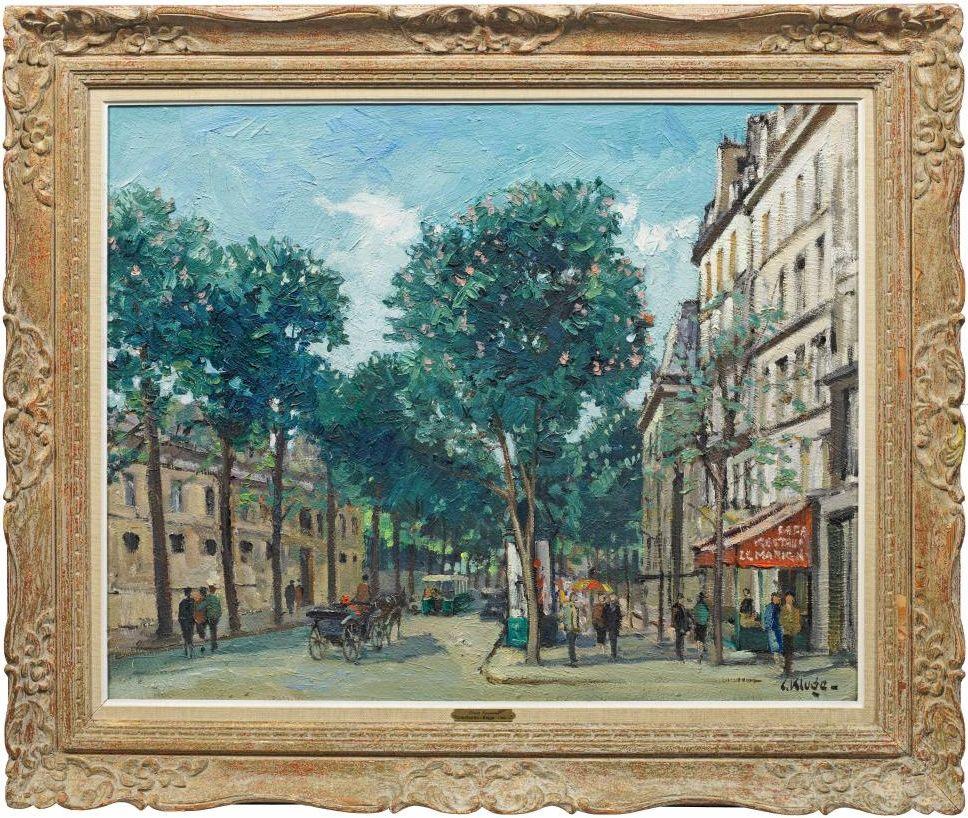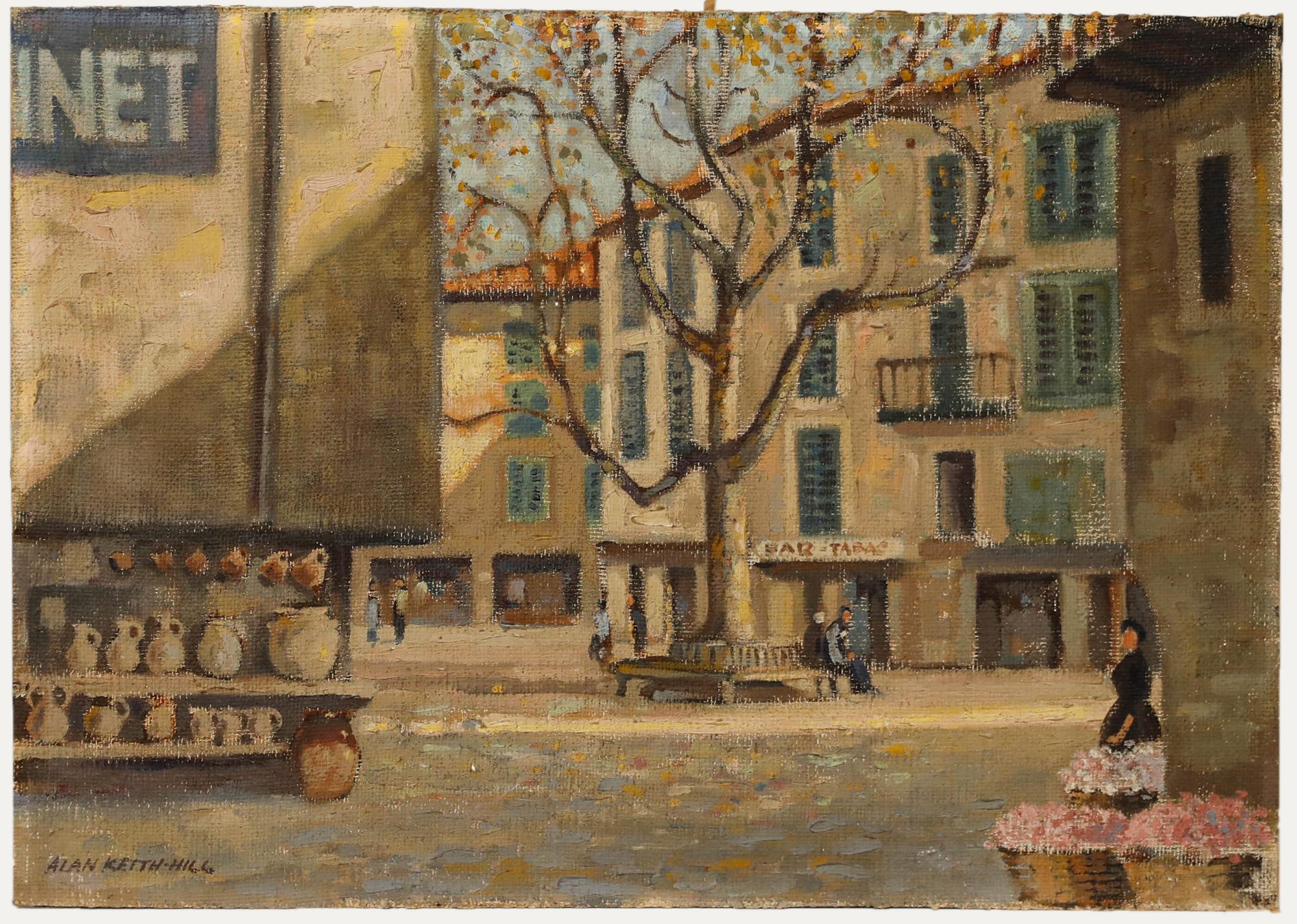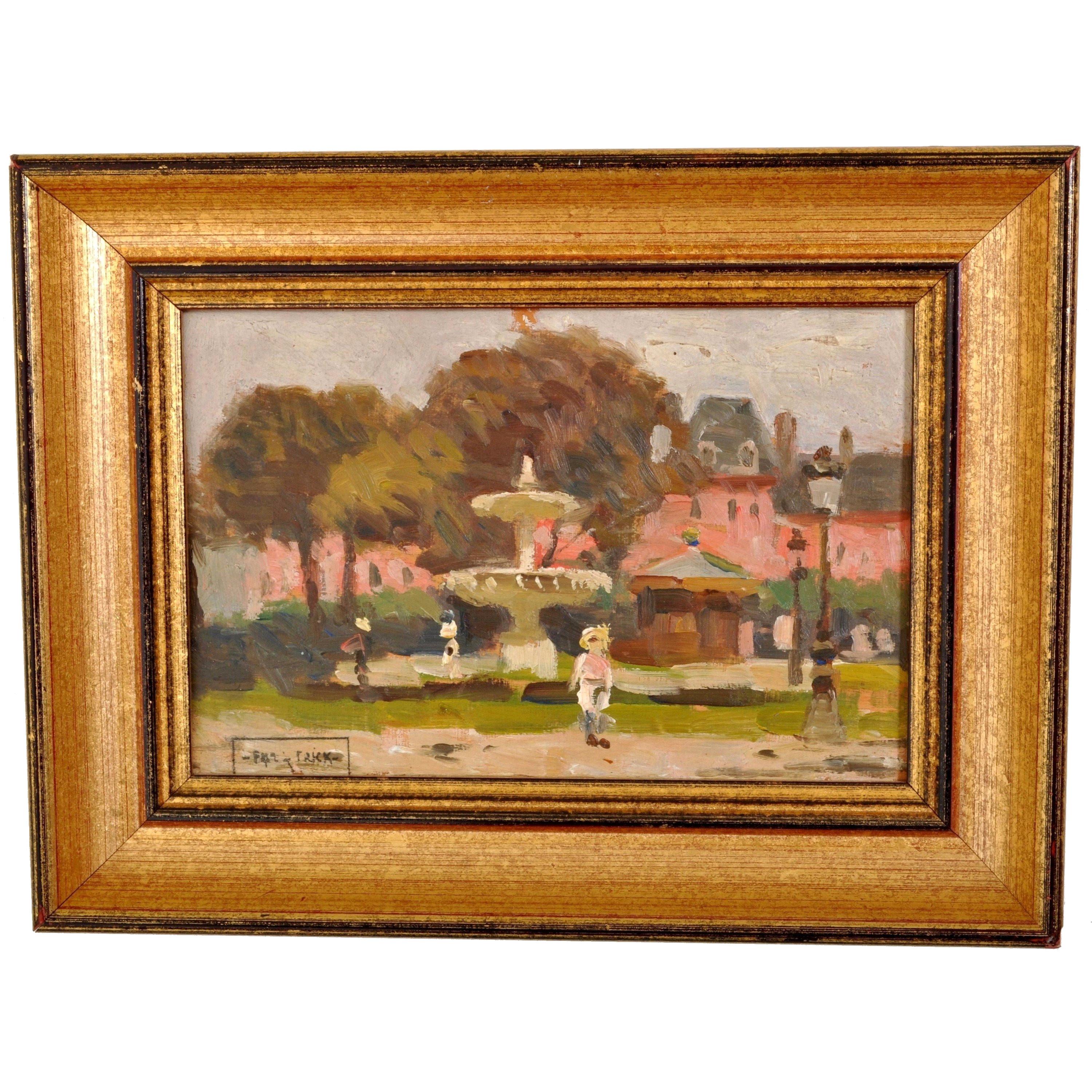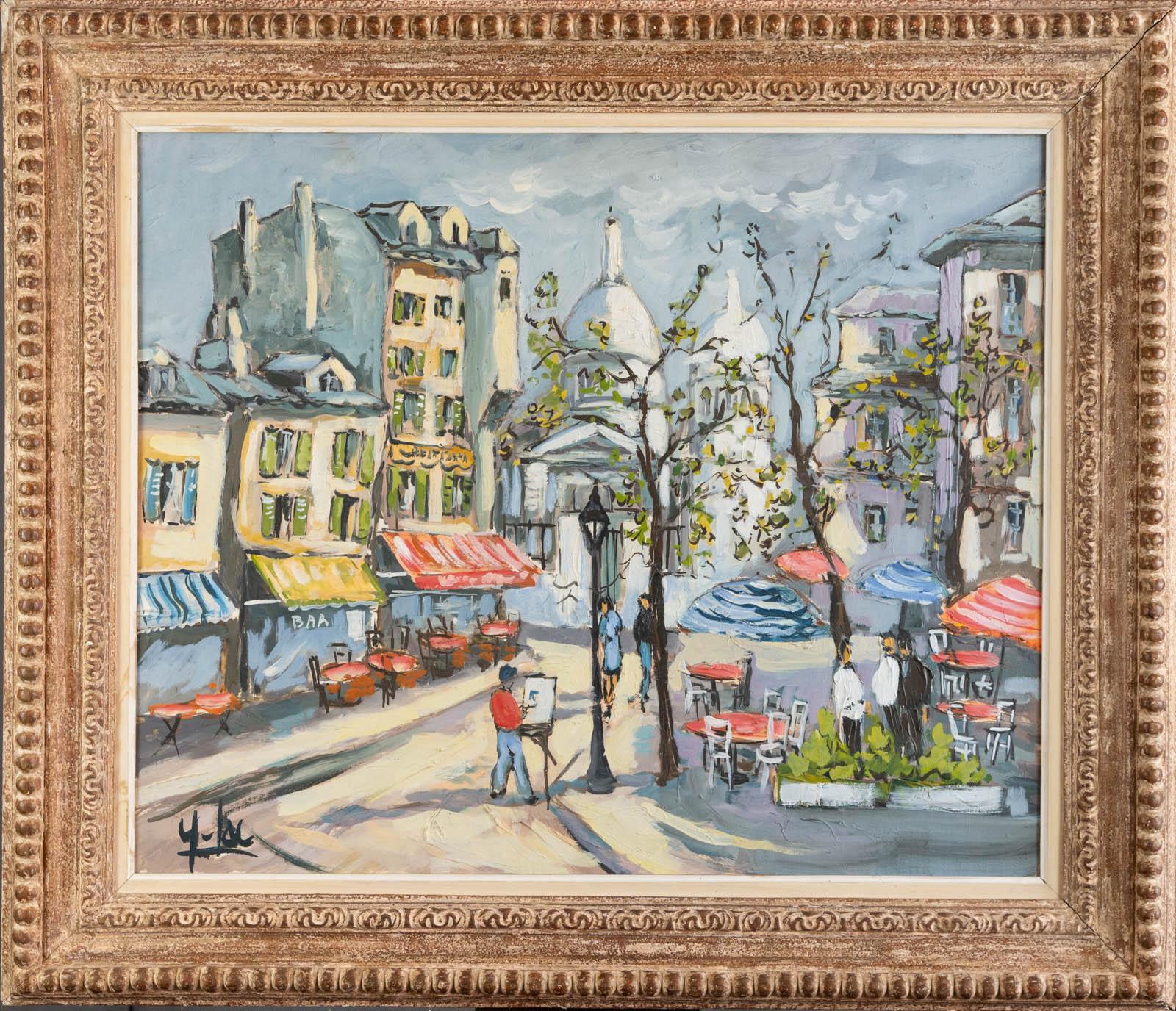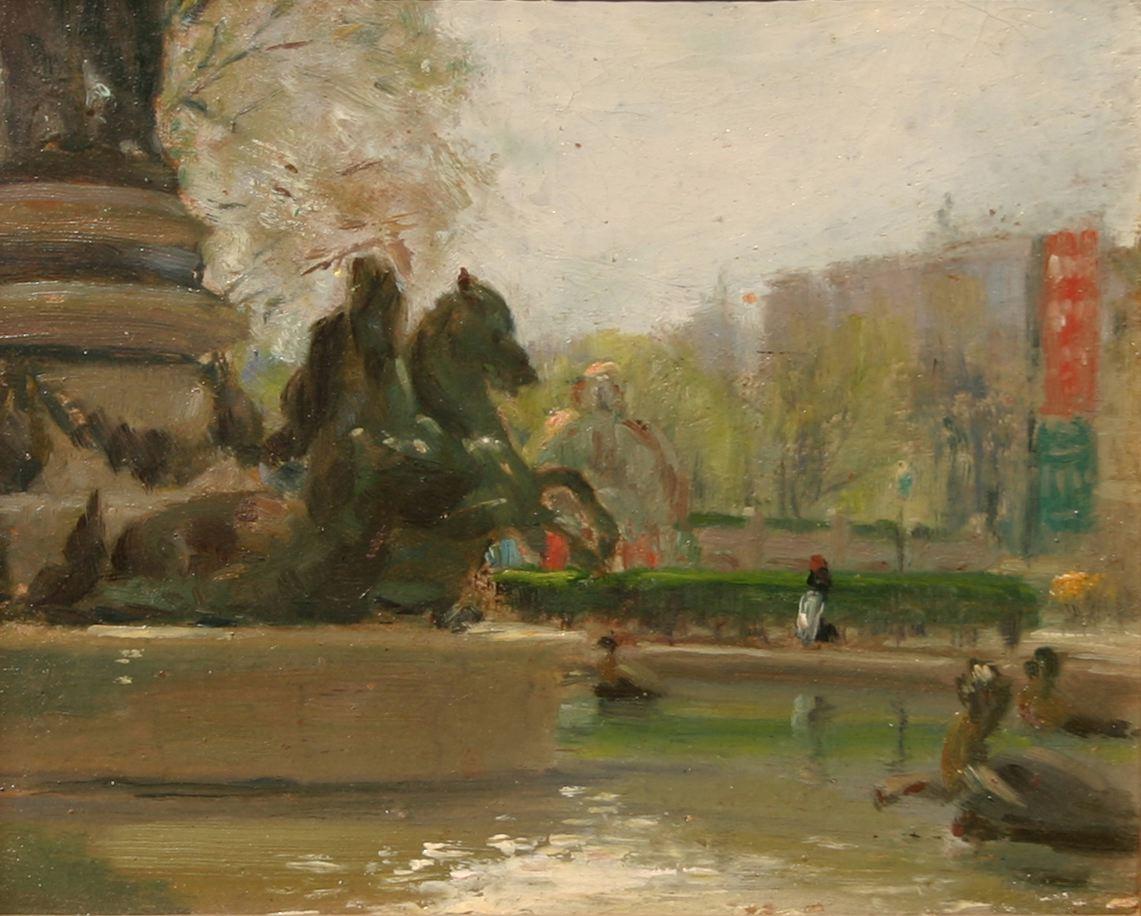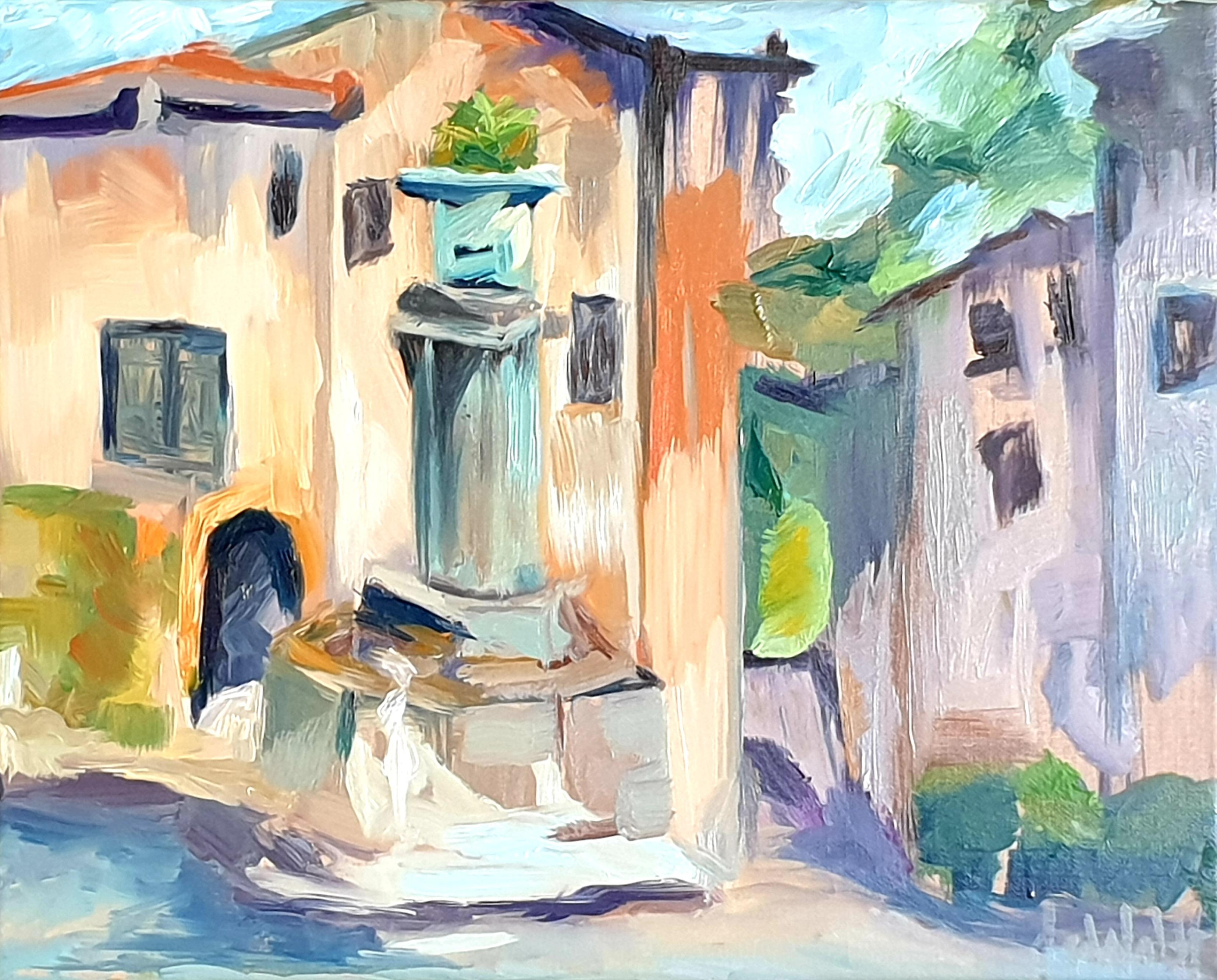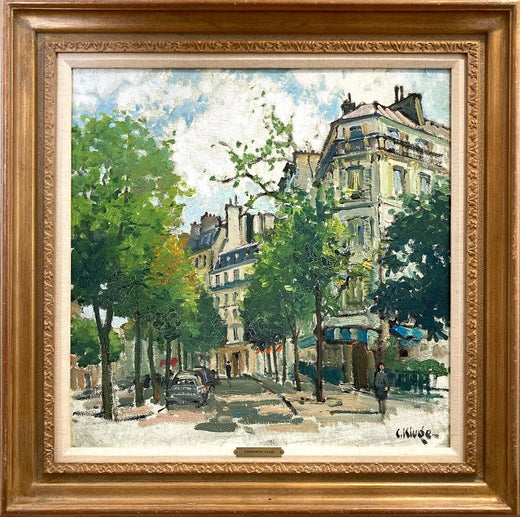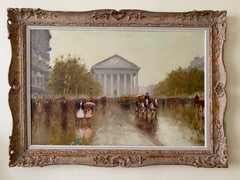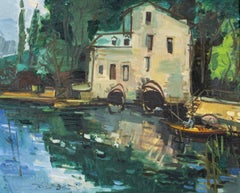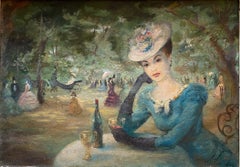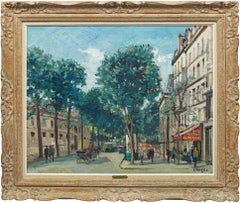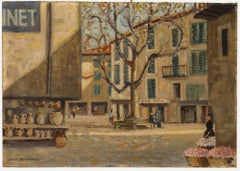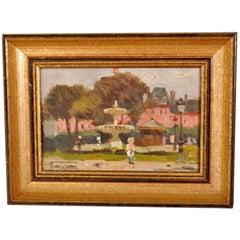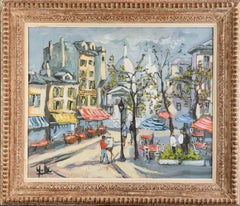Items Similar to The Fountain du Cours, Cotignac
Want more images or videos?
Request additional images or videos from the seller
1 of 7
Constantin KlugeThe Fountain du Cours, CotignacC. 1970's
C. 1970's
$7,500
£5,641.58
€6,502.86
CA$10,564.58
A$11,591.86
CHF 6,066.64
MX$142,656.55
NOK 76,430.58
SEK 71,588.62
DKK 48,556.14
About the Item
A beautiful Post-Impressionist work of the town of Contignac, in the south of France. The long, central "square", Cours Gambetta, parallels the main street through the village. The Cours is shaded by plane trees and is filled mainly with outdoor tables from several cafés and restaurants lining one long side.
Fronting the square there are shops and restaurants along the far side of the main street, and then a grid of parallel streets to the east, with village houses.
The Fountain du Cours which is in the foreground was built in the early 1800s .
Provenance: Wally Findlay Gallery, NYC
Kluge was born in Riga, Latvia, on January 29, 1912, in Russia..
His father was a graduate of the Polytechnic Institute of Riga and his mother a Professor of Literature. Kluge's father was drafted into the Czar's army in 1914. Then the chaos of the 1917 Bolshevik Revolution and the ensuing Civil War completely uprooted the family.
They moved frequently, always eastward, arriving in Manchuria in 1920. Here the little boy learned to speak Mandarin. In 1925 the émigré family moved again, this time to the French "concession" of Shanghai, where Kluge would graduate from the French Municipal High School.
By the time he was seventeen, he was a very active member of the Shanghai Art Club. At this period of his life he also took up the violin and cello, and later in Paris gave music lessons to help meet his expenses. Meanwhile, his parents had decided that pure art was not a dependable career, and so in 1931 Kluge left Shanghai for Paris to study architecture. He spent six years at the E'cole des Beaux-Arts and in 1937 graduated with the title of French Government Architect.
The years spent studying and living in the Latin Quarter of Paris had created in Kluge a strong attachment to the characteristic scenes of Paris, and, instead of returning immediately to Shanghai and his family, he stayed on in Paris for six months painting views of Paris in oils, purely to portray and preserve the scenes he so loved. The childhood years spent in the Orient had contributed to his love of painting.
His professor of Chinese had taught him, from the age of ten, a respect for the handling of the brush, and the attitude of the Orientals toward the beauties of nature drew the young artist to the depiction of beauty and away from the vogue for the ugly and sordid in painting. When Kluge returned to China, he practiced his profession of architecture for a time. But when his friends persuaded him to exhibit his paintings, the exhibitions were so successful and aroused such enthusiasm that Kluge felt that painting, his first love, could afford him a livelihood. Kluge spent the years of World War 11 in Shanghai convinced that he avoided trouble with the Japanese occupiers only because of the respect and love the Japanese people have for painting.
In mid-1946 he accepted an architectural post in Hong Kong and continued to paint in his spare time. In March, 1950, amid rumors that the Chinese Communists might invade Hong Kong, Constantin Kluge left Asia for good and returned to his beloved Paris. Already a mature and successful painter by the time he reached Paris, it is not surprising that he won an award and considerable attention at the Paris Salon in 1951. Since that time he was a frequent exhibitor in the Salon shows, which proved to be his gateways to ever increasing public attention. Kluge was a member of the Societe' des Artistes Francais, and his works won prizes at their Salon. In 1961 he was awarded the Medaille d'Argent as well as the special Raymond Perreau prize given by the Taylor Foundation at the Salon.
In 1962 he received the coveted Gold Medal of the Salon. In 1990, Kluge earned one of the most prestigious non-military awards bestowed by the French government: he was named a Chevalier de la Legion d'Honneur by the French Ministry of Culture. In 1991, Kluge was awarded the Grand Medal of the City of Senlis. Completely captivated by the many moods of Paris, Kluge became absorbed in painting this beautiful city. The gaiety and animation of the flower markets; the subtly pensive and poetic quiet areas along the Seine; the special quality of Paris sunshine in early spring; the quaintness yet sophistication of Pairis are wonderfully expressed in his widely varied compositions. His fascination with Paris is contagious and the viewer feels drawn into each Kluge painting. In addition to Paris scenes, Kluge has sought out quiet, picturesque harbor scenes where the colors of water and sails blend to form softly modulated patterns of great beauty and interest. As with his paintings along the Seine, Kluge's handling of water in these harbor scenes is unusually lovely and convincing.
Probably due to his early architectural training, Kluge has in the past been primarily occupied with subjects which include buildings of many types, but pure landscape subjects intrigued him as well. In his country scenes of provincial France, where sunlight and changing atmospheric qualities present a new challenge, Kluge used the same subtlety and sensitive rendering of beauty found in his other work. It is interesting to find this capable painter rounding out his repertoire in such varied fashion. While Kluge continued to paint, he ws also a writer of considerable stature. His autobiography, Constantin Kluge (published in 1987), details his fascinating life and includes many color reproductions of his paintings.
French art critics have declared that Constantin Kluge was a painter of poetic realism. Kluge painted without affectation, in a frank and straightforward style. His firm drawing and well-constructed forms are bathed in an atmosphere of subtle colors. He enjoyed painting and communicated that joy to the beholder.
- Creator:Constantin Kluge (1912 - 2003, French)
- Creation Year:C. 1970's
- Dimensions:Height: 36.75 in (93.35 cm)Width: 44 in (111.76 cm)Depth: 3 in (7.62 cm)
- More Editions & Sizes:28.75 x 36.5 inchesPrice: $7,500
- Medium:
- Movement & Style:
- Period:
- Condition:Very good overall condition .
- Gallery Location:Los Angeles, CA
- Reference Number:1stDibs: LU3916456172
Constantin Kluge
Constantin Kluge was a Russian-born French painter best known for his naturalistic scenes of Paris and French countryside in a style reminiscent of Albert Marquet. Kluge was born to a wealthy military family on January 29, 1912 in Riga, Latvia, which was then a large, industrial Russian port city. He spent much of his childhood and young adult life between Manchuria, Beijing, and Hong Kong, where he discovered a love for brush and ink painting. Kluge studied architecture at the École des Beaux Arts in Paris and earned his diploma in 1937. Upon graduating, he painted the city’s river banks and streets before returning to Shanghai. With the rise of Communism in China, the artist fled to Paris in 1950 and began exhibiting in the French Salons. He was a success both artistically and financially. Of his many awards, he received the Gold Medal, Salon des Artistes Francais and was made Chevalier de la Legion d’Honneur by the French Government. He died on January 9, 2003 in Paris, France.
About the Seller
5.0
Vetted Professional Seller
Every seller passes strict standards for authenticity and reliability
Established in 1972
1stDibs seller since 2011
409 sales on 1stDibs
Typical response time: 1 hour
- ShippingRetrieving quote...Shipping from: Edgewater, NJ
- Return Policy
Authenticity Guarantee
In the unlikely event there’s an issue with an item’s authenticity, contact us within 1 year for a full refund. DetailsMoney-Back Guarantee
If your item is not as described, is damaged in transit, or does not arrive, contact us within 7 days for a full refund. Details24-Hour Cancellation
You have a 24-hour grace period in which to reconsider your purchase, with no questions asked.Vetted Professional Sellers
Our world-class sellers must adhere to strict standards for service and quality, maintaining the integrity of our listings.Price-Match Guarantee
If you find that a seller listed the same item for a lower price elsewhere, we’ll match it.Trusted Global Delivery
Our best-in-class carrier network provides specialized shipping options worldwide, including custom delivery.More From This Seller
View AllPlace du Tertre)
By Viviane D'Or
Located in Los Angeles, CA
A beautiful, Charming painting by American artist of the plaza in Montmartre, Paris. Original frame.
Category
Late 20th Century Figurative Paintings
Materials
Oil, Panel
Le Madeleine, Paris
By André Gisson
Located in Los Angeles, CA
A beautiful post-impressionist rendering of Le Madeleine, in the background and a bustling Paris in the foreground.
Signed lower left, C. 1960
Original French Impressionist frame, me...
Category
1960s Post-Impressionist Paintings
Materials
Oil
French Country Landscape
By Roger Bertin
Located in Los Angeles, CA
A beautiful Fauvist French country landscape by Roger Bertin. Born in Rue Gabrielle in Montmartre, Paris in 1915, and lived in the same house all his life. His godfather was the poet...
Category
1950s Post-Impressionist Landscape Paintings
Materials
Oil
Lady in the Paris Park
Located in Los Angeles, CA
Beautiful young lady in a Paris Park, signed, Original Frame, listed size includes the frame.
Category
1950s Impressionist Figurative Paintings
Materials
Oil, Panel
$788 Sale Price
49% Off
Parisienne en Vacance
By Edouard Goerg
Located in Los Angeles, CA
Charming French oil painting c1960.
Beautiful French frame.
Category
1960s Art Deco Figurative Paintings
Materials
Canvas, Oil
$2,138 Sale Price
24% Off
Au Cafe
By Francois Chabrier
Located in Los Angeles, CA
FRANCOIS CHABRIER
“”AU CAFE"
OIL ON CANVAS, SIGNED
FRANCE, C.1960
32.5 X 39.5 INCHES
Framed 41 x 48 inches.
François Chabrier
Born 1916
François Chabrier was born in 1916 in Bel...
Category
1960s Art Deco Figurative Paintings
Materials
Canvas, Oil
$4,600 Sale Price
20% Off
You May Also Like
Place Beauvau. Paris. Oil on canvas, 73, 5x92 cm
By Constantine Kluge
Located in Riga, LV
Constantin Kluge was a Russian-born French painter best known for his naturalistic scenes of Paris and French countryside. Kluge was born to a wealthy military family on January 29, ...
Category
1940s Impressionist Landscape Paintings
Materials
Canvas, Oil
Allen Keith Hill - Mid 20th Century Oil, Place du Peyra
Located in Corsham, GB
Signed in the lower left. Titled and inscribed on the label verso. On board.
Category
20th Century Landscape Paintings
Materials
Oil
$285 Sale Price
20% Off
Antique French Impressionist Oil Painting "Place des Vosges" Paris Paul de Frick
By Paul de Frick
Located in Portland, OR
Antique French Impressionist Oil on Panel by Paul de Frick, Place des Vosges Paris, 1908.
Antique oil painting by French Impressionist artist Paul de Frick (1864-1935), signed & date...
Category
Early 20th Century Impressionist Landscape Paintings
Materials
Oil, Board
Place du Tertre
Located in LE HAVRE, FR
Yves LAC (1944-2021)
Place du Tertre
Oil on canvas.
Size: 60 x 73 cm
Signed lower left.
Painting in good condition.
Montparnasse type frame. Offered
Size with frame: 81 x 92 cm
...
Category
1960s French School Landscape Paintings
Materials
Canvas, Oil
Parisian Fountain, 1899
Located in Bryn Mawr, PA
Albert Jean Adolphe was known as a decorator, a portrait painter, and a landscape artist. He worked in oil and watercolor. Born in Philadelphia in 1865, he attended the Pennsylvania ...
Category
Late 19th Century Impressionist Landscape Paintings
Materials
Oil, Board
Impressionist Oil on Canvas. "La Fontaine à Tourtour", Provence.
Located in Cotignac, FR
Contemporary impressionist oil on canvas of a fountain in Tourtour, Provence by American artist Lisa de Wolff. Signed bottom right.
A highly colourful and energetic oil painting of ...
Category
21st Century and Contemporary Impressionist Landscape Paintings
Materials
Canvas, Oil
More Ways To Browse
Painting Of Fountains
French Quarter Painting
The Used Drafting
Japanese Bath
E A Taylor
Orient Express
Japanese Vintage Plane
French Flower Market Oil
La Vogue Vintage
1970s French Post Impressionist Painting
Medaille D Argent
Joy Taylor
Japanese Water Fountains
Occupied Japan China
Drawing Drafting Table Vintage
Ugly Painting
British Impressionist
New Mexico Landscape Oil
